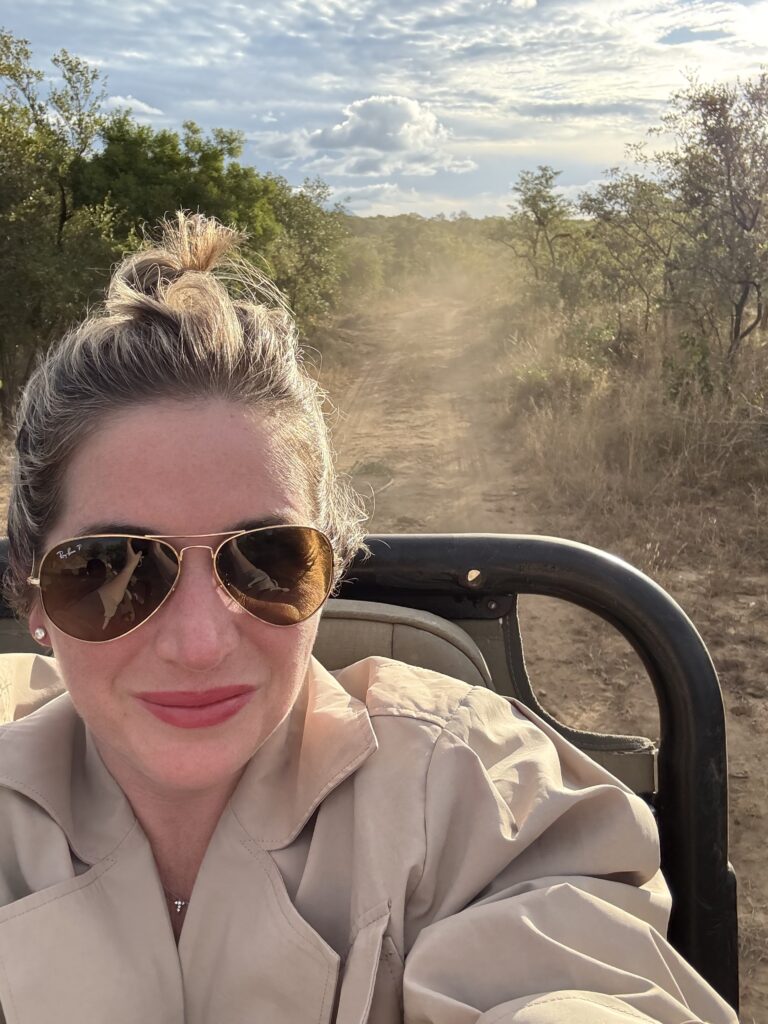A Letter to My Clients: What I Learned on Safari

I grew up in southern Oklahoma, where mornings and evenings often meant riding around the land with my dad. Farmers would check on the animals at those times because that’s when they were up and moving—eating, grazing, active. It was outside of the heat of the day, when the land felt cooler and calmer, and when you could count on finding the animals in their familiar spots. Those drives became part of the rhythm of life, a natural pause at the edges of the day.
I can still remember the quiet magic of those moments: the animals stirring awake in the mornings, the crickets and night sounds rising in the evenings. There was a sense of peace in simply being still and listening, a kind of grounding that stays with you even if you don’t realize it at the time.
Years later, when I went on my first safari, I wasn’t expecting to feel that same familiarity. But the moment I set out on that first game drive, I was overwhelmed with emotion—it felt like being five years old again, riding in my dad’s car, watching the land and animals come alive. That deep sense of peace came flooding back, and it brought me to tears.
It also made me think about life now—about my kids, our full calendars, the constant pull of sports schedules and city living. Somewhere along the way, we lost those natural pauses. Safari reminded me how rare it is to stop, to be still, to listen to the world around you.
When clients ask what to expect on safari, I realize now my perspective has completely shifted. You won’t be bored. You’ll be amazed. You may even be changed. But until you’ve gone yourself, it’s hard to fully grasp.
What struck me most was the wildness, and yet the quiet rhythm of it all. With the right guides, you can find yourself just feet away from a pride of lions or a herd of elephants. And what’s astonishing is how they respond—or rather, how they don’t. Back home, if you happen upon a deer, it startles and bolts the second it notices you. But on safari, the animals don’t run. They don’t approach. They simply continue on, living their lives, allowing you to sit quietly and observe. To witness that, without barriers, is extraordinary.
Before my first safari, I imagined something closer to a staged experience—safe, predictable, almost like a ride at Disney. But the reality couldn’t be further from that. There are no guardrails, no enclosures, no barriers. You are out there, side by side with the animals, trusting the knowledge of your guides. The land, the animals, the rhythm of life in the bush—none of it bends to you. You bend to it.
And that’s the gift. In a heartbeat, the dynamic can change. A predator appears. A herd shifts direction. The rhythm of the land is always moving, and you’re reminded again and again: these animals are wild, and you’re witnessing them exactly as they are meant to be.
That’s why people call safari life-changing. Not simply because of the animals you see, but because of the way the experience slows you down, reconnects you, and restores a rhythm you may not have realized you lost.
For me, safari brought me back to the quiet edges of my childhood days in Oklahoma—back to those rides with my dad, back to the peace of watching animals just live. And that stillness, that sense of wonder, is what I hope each of you will one day experience for yourselves.
Best,
Summer
COPYRIGHT © 2025-2026 DeFehr Travel | PRIVACY POLICY | TERMS + CONDITIONS | Brand + website by MK Design Studio
@defehrtravel
Oklahoma City Travel Advisor
Based in OKC, serving clients from NYC to LAX